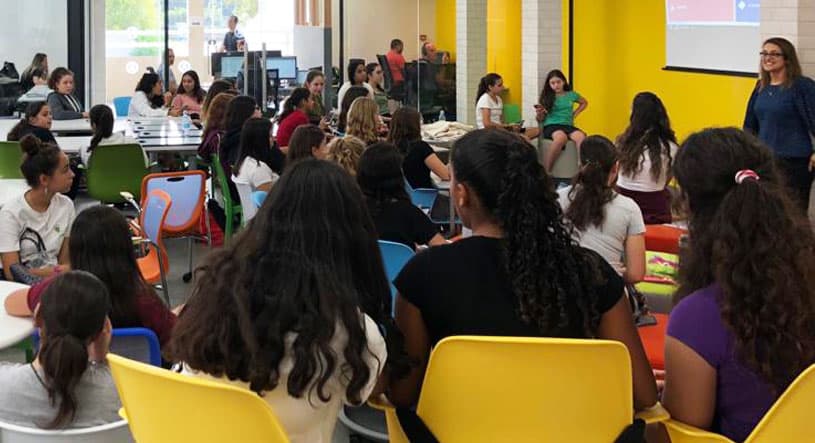AMIT’s Gogya teacher-training center, which opened nearly five years ago, has already brought innovative, forward-thinking changes to the way the students at our 110 schools learn. Now it has gone a step further in its goal of preparing AMIT students for the 21st century by opening an on-site “academy of entrepreneurship and innovation.”
This initiative, which got underway after the Jewish holidays, comprises two parts: an entrepreneurship incubator and a maker’s space. Students from five AMIT schools are coming to the newly opened innovation hub to learn the fundamentals of the Israeli high-tech and startup world. They spend either an hour and a half a week or three hours biweekly there, and get real-life, hands-on experience establishing a startup. That entails everything from learning about project management and programming to pitching their startup ideas to venture capital funds.
What’s truly unique about the program is that the students are learning from established entrepreneurs, about a dozen of whom recently relocated their office to a WeWork-type office setting within the Goyga center. These mentors model for the students how business is conducted and how to work effectively as a team. The program is run by veteran industry executive Galia Kedmi Fragman, who has more than 20 years of experience in early-stage startups and Fortune 500 companies. She has a team of about 150 volunteers from the Israeli high-tech world who take part in the program, meeting with the students, giving lectures, and offering feedback.
“Adolescents have many ideas that are not seen through to fruition due to a lack of knowledge and an environment that is not able to provide appropriate support for their needs,” said Kedmi Fragman. “This junior entrepreneurship program helps them overcome these obstacles in a personal and experiential manner and enables them to become part of the world of entrepreneurship in Israel.”
 The seed for the incubator was planted about five years ago when Kedmi Fragman started volunteering as a computer science teacher at AMIT’s Kfar Batya campus in Ra’anana, where the Gogya center is now located. Prompted by the question “How can we instill the idea of personal entrepreneurship in AMIT students?” she and the Gogya R&D staff began envisioning what such a project would look like.
The seed for the incubator was planted about five years ago when Kedmi Fragman started volunteering as a computer science teacher at AMIT’s Kfar Batya campus in Ra’anana, where the Gogya center is now located. Prompted by the question “How can we instill the idea of personal entrepreneurship in AMIT students?” she and the Gogya R&D staff began envisioning what such a project would look like.
Ultimately, their goals were threefold: to create an environment where students could realize their ideas and dreams; to introduce them to entrepreneurship in an experiential and practical way, and to encourage students’ personal thought and development while taking into account their strengths and weaknesses.
Now that their goals have become a reality, students from five schools—AMIT Yud Ashdod, AMIT Renanim, Gwen Straus, and the Hevruta yeshiva in Ra’anana, and AMIT Shachar school for girls in Beit Shemesh—come to the innovation center to unleash their inner entrepreneurs.
The program extends over three years. During the first year, those in the startup track learn the fundamentals about startups, artificial intelligence, machine learning, and more. In the second and third years, a smaller group of 15 students establish a startup and then those who really show potential bring the idea into fruition while working with the industry mentors.
The maker’s space—which is outfitted with 3D printers, Arduino and other electronics, wood, paper, and other craft materials—aims to teach students who prefer to work with their hands the same values and equip them with the same 21st-century skills.
“The important values that I want to advance at the entrepreneurship hub are teamwork—no entrepreneur has accomplished anything alone—as well as determination and persistence,” said Kedmi Fragman. “No entrepreneur ever came up with an idea one night and sold it for $1.5 billion the next day.”
Regardless of whether they are in the startup or maker track, all of the students are learning a skill set they don’t learn elsewhere and that can be applied to various aspects of life: how to make a presentation in public; how to create a presentation that tells a story; how to manage a project; how to listen to diverse opinions and accept failure; and how to manage conflict among team members.
For Kedmi Fragman, the ultimate objective isn’t to transform all of these kids into entrepreneurs, but to give them a space in which they can express themselves and realize their dreams.
“Not everyone will become Bill Gates or Steve Jobs,” she said, “but it’s important to me to encourage them to believe they can turn their thoughts into reality.”





